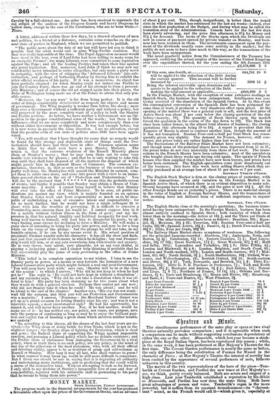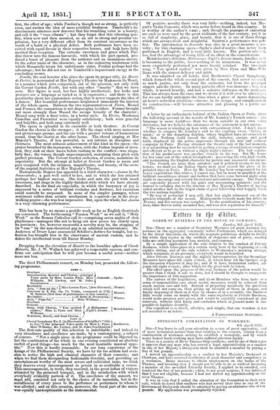ittattto unit Zuffir.
The simultaneous performance of the same play or opera at two rive theatres naturally provokes comparison ; and it is agreeable when such a comparison can be made without suggesting conclusions depreciatory of either the one or the other. Ifaeaniello, which last year became a stock- piece at the Royal Italian Opera, has been reproduced this season ; while, in the same week, it has been performed at Her Majesty's Theatre for the first time. The Covent Garden performance is nearly the same as before, the only difference being the substitution of Formes for Massol in the character of .Pietro: at Her Majesty's Theatre the interest of novelty has- been excited by the appearance of several performers of note, hitherto. unknown in this country. The merits of the two representatives of the hero of the piece--Tam- berlik at Covent Garden, and Parchini the new tenor at Her Majesty's— are, we think, pretty evenly balanced. Both are actors and singers of a, high class. Last year Tamberlik established a reputation by his debut as Hasaniello, and Pardini has now done the same thing. Both have great advantages of person and voice. Tamberlik's organ is the More powerful, but it suffers from its constant tremulousness—its " chevrot- taut " sound, as the French would call it—which gives it, especially at first, the effect of age; while Pardini's, though.not so strong, is perfectly even, and excites the idea of more youthful freshnese. Tamberlik's in- discriminate admirers now discover that his trembling voice is a beauty, and call it the "voce vibrate"; but they forget that this vibrating qua- lity, when now and, then assumed, as an aid to strong and peculiar ex- pression, has a very different effect from its constant occurrence as the result of a habit or a physical defect. Both performers have been re- ceived. with equal favour at their respective houses, and both have fully merited their reception. The extreme sweetness and grace which Par- dial threw into the famous barcarole, with which his part opened, pro- duced a burst of pleasure from the audience and an unanimous encore. In the softer traits of the character, as in the endearing tenderness with which Masaniello treats his unfortunate sister, Panlini perhaps had the advantage ; but he did not rise to Tamberlik's impassioned energy in the concluding scenes.
Fine/la, the real heroine who gives the opera its proper title, La Muette de Portia; is personated at Her Majesty's Theatre by Mademoiselle Monti, in a manner which puts comparison out of the question, not only with the Covent Garden Penelke, but with any other muette" that we have seen. Her figure is neat, her face highly intellectual; her looks and gestures are a language as varied as it is expressive; and there is this peculiarity about her pantomimic action, that it never suggests the idea of a dancer. Her beautiful performance heightened immensely the interest of the whole opera. Between the two representatives of Pietro, Massol and Formes, the comparison is not disparaging to either. Formes brought out more strongly than Massol the savage ferocity of the character ; Massol sang with a finer voice, in a better style. In Elvira, Mesdames Castellan and Fiorentini were equally satisfactory; both were graceful and ladylike, and both sang extremely well.
The opera is splendid in its ensemble at both theatres. At Covent Garden the chorus is the stronger ; it fills the stage with more numerous and picturesque groups, and the ear with a greater volume of harmonious sound, than the chorus at the other house. The choral singing at Her Majesty's Theatre, if less powerful, is not inferior in discipline and clearness. The most arduous achievement of this kind in the opera—the prayer breathed by the insurgents, when, with the Italian impulse of devo- tion, they sink on their knees before rushing to the conflict—was singu- larly fine; the voices, though unaccompanied, sustaining their pitch with perfect precision. The Covent Garden orchestra, of course, maintains its superiority. But the attempt at ballet at Covent Garden is mean and poor compared with the richness, magnificence, and, beauty, of the scene of the nuptial festivities at Her Majesty's Theatre.
Mademoiselle Duprez has appeared in a third character—Amine in the Sonnaraula ; a part well suited to her, and in which she has attained perhaps her highest success. She looks and acts the part with much sweetness, and sings in the highly-finished style which we have already described. In the final air especially, in which the buoyancy of joy is expressed by a series of brilliant roulades and fioriture, her execution could scarcely be surpassed. In some of the simpler passages, where sentiment rather than artistic mechanism is required—as in the sleep- walking prayer—she was less impressive. But, upon the whole, her Amine is a very charming performance.



























 Previous page
Previous page